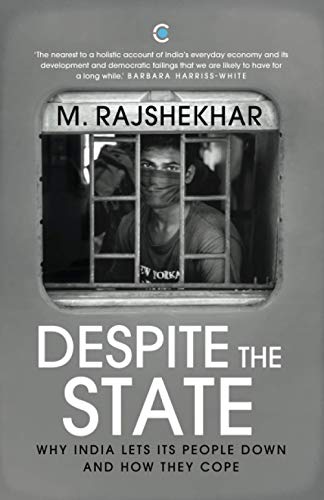Most Indian live despite the state, as opposed to flourishing under it. The structures and processes responsible for that outcome also threaten India’s democracy – not just the greatest accomplishment in the subcontinent’s history but also one of the most audacious experiments in the postcolonial world. Understanding them better is the first step towards a more just country.
Why I picked this book?
The title of the book was interesting and the question it posed, “Why India lets its people down and how they cope?” is something that was bothering me as well. So in order to get some answers I picked this up and it was more than worth a read.
The Book
Despite The State is a fine example of the ground reporting by journalist M. Rajahekhar. Working on a project called “Ear to the Ground”, the author has covered six states of India and tried to understand how the state governments consistently failed their citizens. On one hand the state failed to provide the basic amenities like schools, healthcare and on the other it plundered the natural resources of the country. From the northeastern state of Mizoram to Orissa, Bihar, Gujrat, Punjab, and Tamil Nadu the author chronicles the failure of the state to provide one thing they are elected to provide – governance. All these different states plagued by different problems but, have one thing in common and that is the abdication of the responsibilities by the states towards their people.
The hilly state of Mizoram is unable to pay salaries to their employees as it is not able to generate its own revenue, because of the economic policies or the lack of it. The plundering of natural resources of Orissa favouring select few as a result despite a mineral rich state Orissa is still a backward state and most of its people live in abject poverty. The complete control of one family of the resources of Punjab, Tamil Nadu, once considered a welfare state is now mired by populism despite having some great work done by the government. Gujrat touted as the “model” state by PM Modi and various media houses over the years is a laboratory of the majoritarian politics, which is now spread all over the country. And Bihar, which as the general perception is about it is a state where the governance in absent.
I found State failure in all six states I reported from. Governments failed to deliver health, education and justice. Self-interested political parties, entirely unable to deal with the challenges before their state, hid their failure through denial, diversion, leadership cults and endorsement from others. Watchdog institutions rarely held power accountable. Citizens fell back, not on democratic remedies, but on caste and religious structures to keep insecurity at bay. In all, Indian democracy seemed more performative than real.
The author tells the stories of neglect of the State of their primary responsibilities, collusion of the State with the industrialist to favour them in looting the national resources, the apathy of the government to the problems faced by common people. As a result of the unchecked irregularities, it is the citizens who face the problems, like environmental degradation and pollution which affects the people at the bottom mostly. Also, there is a comment on the state of the falling democracy in India and the suppression of democratic rights of the citizens. A state which has abandoned their most vulnerable to themselves and is hand in gloves with the rich and the powerful.
There are some great reportages by the author covering these six states, speaking to the people on ground. As V Geetha says in the afterward, “This is new writing. The focus is not ‘India’, either as an idea or material entity, but an India as lived by millions of its citizens: within bounded linguistic and cultural limits, shaped by political traditions that are specific to the region in question and which cannot be easily assimilated to broad theories of ‘development’.
A very informative and insightful book backed up with great on the ground reporting to understand the working of the government. A must read for everyone who wants to know what plagues our system and why having so much, India is still lacking in many social and human development parameters.
About The Author
M. Rajshekhar started his career as a business reporter in 1997. He joined Scroll.in in 2015 to do a thirty-three-month-long reporting project, Ear to the Ground, which became the substrate for this book. This series won the Ramnath Goenka Excellence in Journalism Award (2015), the Bala Kailasam Memorial Award (2016), and two more Shriram Awards for Excellence in Financial Journalism (2015 and 2016) He now writes on energy, environment, climate change, political corruption and oligarchy. His reportage can be found at www.mrajshekhar.in.
